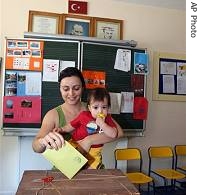2007年VOA标准英语-Turkish Voters Choose New Parliament in Crucial
搜索关注在线英语听力室公众号:tingroom,领取免费英语资料大礼包。
(单词翻译)
By Sonja PaceIstanbul
22 July 2007
Turkish voters went to the polls Sunday to cast their votes for a new 550-seat parliament. As VOA's Sonja Pace reports from Istanbul, the choices are varied1 and the election is widely seen as crucial for Turkey's future.
There is no shortage of choice - 14 political parties and a large slate2 of independent candidates are vying3 for seats in parliament.

Yeliz Turbay Hizal holds her one-year old son Baris as she votes at a polling station in a primary school in Ankara, 22 Jul 2007
By mid-day the stream of voters was steady, even at small polling stations. Despite the timing4 of the balloting5 during summer vacation time, interest is running high and opinion polls show that Turks feel there is a lot at stake.
Comments from voters at this central Istanbul polling station were consistent with the general division of opinions.
Muzaffer Akman says he is voting for the ruling Justice and Development party, AKP led by Prime Minister Recep Tayyip Erdogan.
"I'm going to vote for the AK Party of Tayyip Erdogan because he has a strong stand and he has done good work for the last five years," he said.
And what does he want him, the party to do in the next five years?
"I want them to focus on the unemployed," Akman said.
Opinion polls show that unemployment is the number one concern for most voters. But for others, the issue of religion versus6 secularism8 is of major concern.
English teacher Gultac Horasan says that is why she voted for the opposition9.
"The main thing we're looking for is secularism. We're all afraid that secularism is in danger," said Horassan. "We hope to have a free Turkey, a liberated10 Turkey, a secular7 Turkey. I have been living in Istanbul for such a long time and never before have I felt so threatened of how I dress and how I act."
The dividing lines were clearly drawn11 during the campaign. The AKP vowed12 to continue its pro-reform, pro-business agenda. Its rivals, however, distrust the AKP's Islamist roots and Turkey's staunchly secular proponents13 accuse it of seeking to impose Islamic rule on the country.
Many also accuse the AKP of being soft on terrorism and of not doing enough to crack down on attacks by ethnic14 Kurdish separatists in the southeast of the country.
Parties must get a minimum 10 percent of the vote to make it into parliament. For many, especially from the Kurdish minority, that has posed a problem. So this time, Kurds are fielding independent candidates to avoid the minimum threshold.
Melice Celik says that is why she is voting for an independent.
"These elections are important not because we're going to be the majority in the parliament, but because we have one candidate that actually represents us for the first time," she said."
The AKP is widely expected to win the most votes. Its main secular rival the Republican Peoples' Party, CHP, is likely to come in second. The right-wing Nationalist Action Party, MHP, is also given a good chance of getting into parliament as are dozens of independent candidates, including those from the Kurdish minority.
 收听单词发音
收听单词发音 




